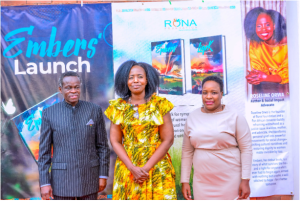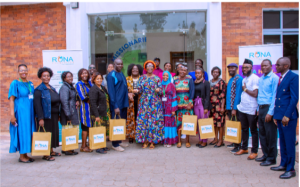Scaling Voice, Shifting Systems: A Widow’s Story of Change!
I was 32 when widowhood found me. In my living room on Ngong Road, I opened the door to women carrying the same grief. We left our slippers—what some would call sandals—at the door and sat together, crying, praying, surviving. Seven widows at first. Then fifty. Then more, and more.
And somehow, between the tears, we laughed too. Measured laughter, almost guilty. Sprinkled into our grief like salt tossed with flair by that chef on TikTok—his name escapes me. That is how the Rona Foundation was born.
13 years later, that small living room circle has grown into a movement of 15,000 widows in Siaya County, with chapters in 17 counties across Kenya, and the African Widows Support Network (AWSN) connecting members in 13 countries—strong enough to shift systems.
In 2025, I led the successful adoption, and now enactment of the Siaya Widows Protection Act—outlawing harmful practices and establishing a fund, local committees, and a dedicated department for widow affairs. A year earlier, I co-led the inaugural African Widows Summit in Zanzibar (2024).
Now recognized as a best practice in advancing widow rights by the Loomba Foundation—a leading UK widow charity—and affirmed by peers across our regional movement. Lord Loomba’s words, spoken at the House of Commons in London —where I was invited to share my story echo true: “Widows should speak out, on their own.”
In Siaya, we are rewriting our destinies—saying enough is enough through this law. Living proof that an investment in voice can shift systems.
I know firsthand the cost and commitment of scaling. In the beginning, and for seven years, I self-funded this work—even selling my car to carry widow voices to global platforms. Scaling, for us, was never about multiplying budgets or adapting . It was about multiplying voice.
Today, I stand as what some may call an “unlikely” proximate leader—and what my mentor calls an “evangelist of scale of voice.”
Reason I carry this truth: widows are not charity cases, but catalysts of systemic change, worthy of investment. For within their lived realities lies the power to unleash collective transformation, supported by allies.
And as an African philanthropist, I have come to see with clarity that true impact is when communities reclaim and rewrite their destinies—and it is scaling voice that makes this transformation possible, and sustainable.
From 7 widows—no, ‘seven slippers’—at my doorstep, to 15,000 voices and a law now protecting them. From whispers in grief to movements shifting nations. Our story is proof: when voices rise, systems shift.
And often, it is fateful events that become the midwives of vision. This is my story—where loss was not the end, but the beginning of sustainable change.
I believe —by adopting this model, widow-led reforms can be scaled across rural villages and communities across Africa.
Roseline Orwa, a widow champion, and the Founder and Executive Director of the Rona Foundation, a Kenyan widow human rights organization. She tweets @roselineorwa



